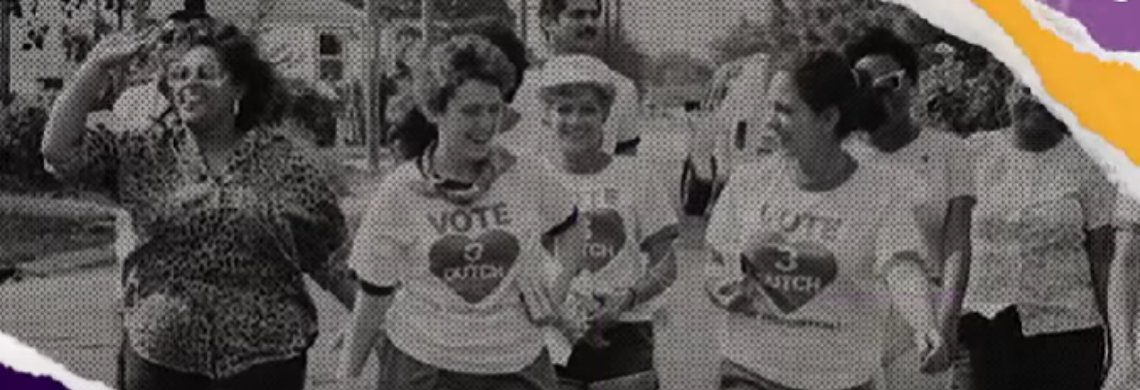The 19th Amendment to the US Constitution extended the vote to American women in 1920. Its passage served as the crowning achievement of a decades-long struggle by women across the nation to be part of the democratic process.
But the story of women’s voting rights in New Orleans began long before the 19th Amendment’s passage and continued for decades after it. Even after 1920, Louisiana laws effectively disenfranchised Black women. As many white women began going to the polls and increasing their political participation in segregation-era New Orleans, African American women continued to fight for access to the ballot. From paying unjust poll taxes to organizing voter registration drives, Black women challenged their status as second-class citizens up to and through the passage of the Voting Rights Act of 1965.
This video, produced in conjunction with the exhibition “Yet She Is Advancing”: New Orleans Women and the Right to Vote, 1878–1970, explores New Orleans locations where significant events took place during a century of women’s activism in the city.
A full transcript of the video is reproduced below. Don't want to miss the next video? Subscribe to THNOC’s YouTube channel here.
Script
Women in New Orleans played a significant role in the women’s suffrage movement that led to the passage of the 19th Amendment in 1920. Yet the story of women’s voting rights in New Orleans doesn’t end in 1920, as Louisiana laws continued to disenfranchise Black citizens. Black women in New Orleans fought for access to the ballot up to and through the passage of the 1965 Voting Rights Act. These four New Orleans locations are where significant events took place during a century of women’s activism in the city.
St. Anna’s Asylum, 1823 Prytania Street
In 1878, an event at this site galvanized the women’s suffrage movement in New Orleans. St. Anna’s Asylum was a home for destitute white women and children overseen by an all-female board. A resident left the asylum money in her will. The board members witnessed the will, but the court invalidated the bequest because women legally could not serve as testamentary witnesses.
Suffragist Caroline Merrick described this incident as a pivotal moment: “The bequest went to the State—and the women went to thinking and agitating.” Merrick joined 400 white women in petitioning the 1879 Louisiana Constitutional Convention to give women the right to vote—a petition that was denied. She was also a founding member of the Portia Club—Louisiana’s first women’s suffrage organization.
The Phyllis Wheatley Club, 1438 Euterpe Street
African American women created their own suffrage organizations. This site was once the home of Sylvanie Williams, an educator who founded the Phyllis Wheatley Club in 1894. The Phyllis Wheatley Club was a social, political, and literary organization that advocated for women’s suffrage, education, healthcare, and childcare.
In 1896, the club founded a medical clinic and nurses’ training school, which eventually became the Flint-Goodridge Hospital and School of Nursing. The club also operated a kindergarten, a night school, and a day care. For Phyllis Wheatley Club members, fighting for the right to vote was one of many ways they sought to improve the lives of Black women and children.
The Athenaeum, 1205 St. Charles Avenue
In March 1903, the National American Woman Suffrage Association’s annual convention was held in the building that previously stood at this location. The building was the Athenaeum, a popular event hall built in 1896. It was the first time the association met in the Deep South. Local and national leaders of the women’s suffrage movement, including Susan B. Anthony, spoke before large crowds.
White suffragists in New Orleans did not allow Black women to attend the convention. In response, Sylvanie Williams invited Anthony and other national suffrage leaders to speak to the Phyllis Wheatley Club.
Katie’s School of Beauty Culture and Barbering, 2100 Oretha Castle Haley Boulevard
For more than 40 years, this site was the location of Katie’s School of Beauty Culture and Barbering, which was owned and operated by Dr. Katie E. Whickam. In January 1955, Whickam founded the Metropolitan Women’s Voters’ League at the beauty school. As president of the league, Whickam organized voter registration drives to encourage Black New Orleanians, especially women, to register to vote. The league also held voter registration classes at the beauty school to prepare Black citizens to navigate the registration forms, purposefully made difficult to keep Black voters off the rolls.
Whickam also served as president of the National Beauty Culturists’ League, a professional organization for Black cosmetologists. She used this platform to advocate for voting rights for African Americans, encouraging beauticians and their customers to register to vote. In 1957, she featured Dr. Martin Luther King Jr. as the keynote speaker at the organization’s convention held in New Orleans.
Together, these sites map out a century-long story of women’s suffrage activism in New Orleans. We explore this history in our exhibition “Yet She is Advancing”: New Orleans Women and the Right to Vote, 1878–1920, on display now through November 5 at The Historic New Orleans Collection. Visit hnoc.org for more information.
About The Historic New Orleans Collection
Founded in 1966, The Historic New Orleans Collection is a museum, research center, and publisher dedicated to the stewardship of the history and culture of New Orleans and the Gulf South. Follow THNOC on Facebook, Instagram and Twitter.












